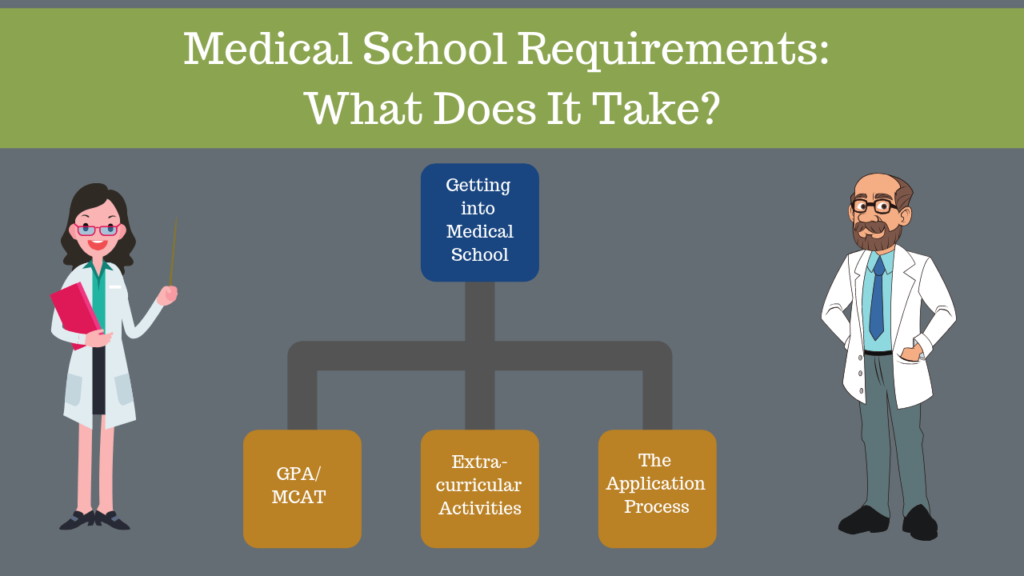If your dream career is to become a professional healthcare worker, you need to understand how the admission process at medical schools works and the requirements to enter one.
Medical schools are known for their thorough review before admitting new students. Each year, new students fill out applications, and millions of dollars in financial aid are given out to prospective students.
The requirements for medical school vary depending on which school one is applying to. Some requirements may seem simple but may take a significant amount of time to complete.
Medical school admission is an involved process that takes time to complete. If you are unable to complete the entire application process within the timeline set by the school, it’s advisable not to apply.
Medical schools are all highly competitive. To make their application process easier, most schools will require applicants to submit their applications as early as possible.

What You Should Know About Medical School Application
A career in the medical field comes with a good paycheck and there is also the possibility of setting up private healthcare facilities.
In general, attending medical school can be quite expensive but some institutions offer scholarships or bonuses to help students get through school. These financial aids
For most schools, financial aid is a large part of the annual cost of attending school.
What to Consider Before Applying to a Medical School
The campus and community that you choose play a big role in the quality of education that you will receive. Community colleges often work well with universities.
However, community colleges may not be able to accommodate the number of students who wish to attend a specific medical school. If this is the case, you may want to consider attending an on-campus school.
For many, attending a traditional four-year university allows them to better complete their education and gain employment elsewhere once they have completed their schooling.
What you need to know about Medical School Admissions
Medical schools’ admissions decisions can be complicated. The many factors that must be considered can cause great stress. However, you should know that the school you attend is important not only to your career but to your life.
You need to be certain that the school you choose meets all of your application’s needs. As long as you are careful in your decision and seek assistance from admission consultants, you will be able to select the school that best suits you.
Medical school admissions advisors will help you with the process of applying to the schools that you are considering. They may also help you to understand the medical school’s admissions requirements.
These consultants can provide information about the admission process at each medical school, as well as help you with the application itself. They will be able to answer any questions you may have and give you advice on which schools to apply to.
If you are not comfortable working directly with an advisor, you can always look for a consultant who can assist you with the process of application and admissions.
These consultants can offer you advice on things such as how to write a good application, what documents you need to submit, what medical schools accept, and more.
You should be aware, however, that there are a variety of consultants. Some are better than others at getting you the information that you need and assisting you with your application.
Medical school admissions advisors are an invaluable resource for anyone seeking to attend one of the many top-ranked medical schools in the country. Medical schools are always looking for talented students, and many of them do not even conduct campus visits.
This means that you can apply to several medical schools without even having to make campus visits yourself. This can save you time, money, and energy, and is a great way to get into one of the best colleges in the country.
Medical Schools Admissions Requirements
Medical schools accept a wide range of people. Some come from family backgrounds that have many years of experience in medicine and other health careers. Others have been studying for years but didn’t hit the jackpot in their academic career so are trying to find out what they have missed out on by not going to school.
The Medical School Admission Test (MBAT) is a part of this challenge. But if you know your background and you are well-prepared, you can make the MBAT an easier process.

Medical Schools Admissions Grade Requirements
Medical schools prefer to admit students who have achieved exceptional grades throughout their high school education. This is one factor that weighs heavily on MBAT results.
It is worth mentioning that the Medical College Admission Test, also known as the MCAT, has long been considered by many to be the toughest exam in the world.
Medical School Prerequisites
While medical school policies vary regarding prerequisites, experts say the following college courses are frequently mandatory:
According to U.S. News & World Report, here are the mandatory college courses usually required by medical schools.
- Biology- including a yearlong sequence with labs
- Chemistry- compulsory two years of study, with four lab-based classes.
- English- mandatory one full year
- Mathematics- mandatory one full year covering courses in calculus and statistics
- Genetics
- Physics- one year
- Psychology
- Sociology
Additionally, there are a few courses that are not needed for admission into medical schools but they are essential for premeds.
These courses include arts or music courses, interdisciplinary courses, foreign language classes, religious studies classes, and medical anthropology or history classes.
Medical Schools Admissions Academic Background Requirements
The second major area of medical school admissions involves the schools themselves. They will want to know what your academic background is as well as what type of career you are planning on entering.
Your GPA is going to be a big factor in whether you are accepted or rejected. So make sure that you spend a good deal of time improving your grades.
If you are going into medicine, you really can’t begin to scratch the surface of the Medical Schools Admissions Requirements, so spending some time preparing for everything that is required is advisable.
Medical schools admit students based on several different criteria. The first one is the academic ranking and levels of the applications that the schools have received during the admission process.
Other things being considered are merit and the number of applications that are received. Ultimately, your rank is a reflection of your academic abilities, but it isn’t the only factor that they take into consideration.
You want to make sure that you fill out as many applications as possible because this shows a potential enrollment level.
Medical Schools Admissions Personal Accomplishment Requirements
It is also important to keep your accomplishments in mind. These may include things such as your GPA in college and your community service hours. This information should be reviewed carefully by the admissions committee.
If you want to go after the medical program at one of the larger medical schools, then you are going to want to show them that you are qualified academically as well as athletically.
Your experiences in your community as well as your achievements will go a long way in helping to set you apart from other applicants.
What is the average GPA for admission to medical school?
Many people have been asking themselves, “What is the average GPA for admission to medical school?” Bear in mind that this is one of the medical school admissions requirements. Since it is now more common than ever before for an applicant to be rejected from medical schools, regardless of their grades.
It is important to remember that the medical school’s admissions process is not the same at every school. Therefore, you need to take a look at your GPA history to make sure that you are not putting yourself at any type of disadvantage when applying to a specific medical school.
Because of the volume of people applying to medical schools, admissions officers have to make some significant initial screening decisions largely based on GPA and MCAT scores.
From thorough research And observations, the average GPA for medical school matriculants has been 3.64 for science, 3.79 for non-science, and 3.71 overall.
The first thing that you should know if you are looking to get your GPA applied to as part of your medical school application is that there are no stupid questions.
Conclusion
When you begin the application process, you will want to make sure that you are knowledgeable about medical schools and their requirements. This will help you avoid any problems when it comes to submitting your materials.
You will want to apply to as many schools as possible. Apply, to programs where you see the most competition. It never hurts to apply to schools that are not always ranked very high, but these are the schools that you will want to focus on.

Leave a Reply